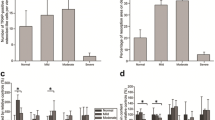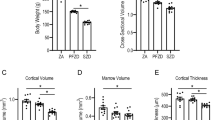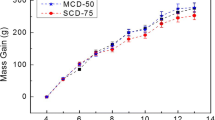Insufficient dietary magnesium (Mg) intake has been associated in humans with low bone mass. Mg deficiency in the rat has suggested bone loss is due to increased bone resorption and/or inadequate bone formation during remodeling. The purpose of this study was to assess the effect of a low Mg diet on bone and mineral metabolism in the young and mature BALB/c mouse and explore the hypothesis that inflammatory cytokines may contribute to Mg deficiency-induced osteoporosis. Using an artificial diet, we induced targeted Mg depletion (0.002% Mg) with all other nutrients maintained at the normal level. In all Mg-depleted mice, hypomagnesemia developed and skeletal Mg content fell significantly. The serum Ca in Mg-deficient mice was higher than in control mice; however, serum PTH levels were not significantly different. Osteoprotegerin (OPG) in dosages that inhibit osteoclastic bone resorption did not prevent hypercalcemia in Mg-deficient animals. No significant difference in serum Ca was observed between groups when dietary Ca was reduced by 50%, suggesting that a compensatory increase in intestinal absorption might account for the hypercalcemia. Growth plate width decreased 33% in young Mg-deficient animals and chondrocyte columns decreased in number and length, suggesting that Mg deficiency reduced bone growth. Trabecular bone volume in the metaphysis of the tibia in these animals was decreased and osteoclast number was increased by 135%. Osteoblast number was significantly reduced. Immunohistochemistry revealed that substance P increased 230% and 200% in megakaryocytes and lymphocytes, respectively, after 1 day of Mg depletion. IL-1 increased by 140% in osteoclasts by day 3 and TNFa increased in osteoclasts by 120% and 500% in megakaryocytes on day 12. This study demonstrates a profound effect of Mg depletion on bone characterized by impaired bone growth, decreased osteoblast number, increased osteoclast number in young animals, and loss of trabecular bone with stimulation of cytokine activity in bone.
Similar content being viewed by others
Author information
Authors and Affiliations
Rights and permissions
About this article
Cite this article
Rude, R., Gruber, H., Wei, L. et al. Magnesium Deficiency: Effect on Bone and Mineral Metabolism in the Mouse . Calcif Tissue Int 72, 32–41 (2003). https://doi.org/10.1007/s00223-001-1091-1
Received:
Accepted:
Issue Date:
DOI: https://doi.org/10.1007/s00223-001-1091-1




